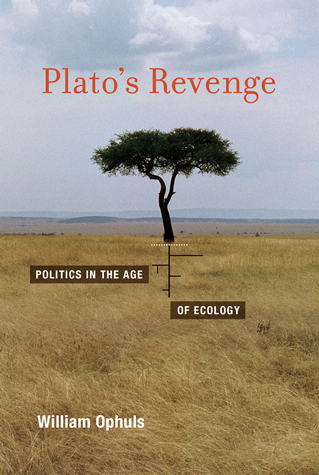If Herman Daly is the economist for sustainable development, Amory Lovins the physicist and Al Gore the politician, William Ophuls must be the philosopher. Ophuls’ first book on the subject, Ecology and the Politics of Scarcity (1997), placed him among the few scholars of the time (Rifkin and Daly in the United States; Leiss and Paehlke in Canada) who had managed to bridge the gulf between science and politics to insist that modern values and the democratic politics associated with them were on a collision course with ecology.
If Herman Daly is the economist for sustainable development, Amory Lovins the physicist and Al Gore the politician, William Ophuls must be the philosopher. Ophuls’ first book on the subject, Ecology and the Politics of Scarcity (1997), placed him among the few scholars of the time (Rifkin and Daly in the United States; Leiss and Paehlke in Canada) who had managed to bridge the gulf between science and politics to insist that modern values and the democratic politics associated with them were on a collision course with ecology.
Timing was important. The Vietnam War was over. Aside from a few terrorist incidents, it was an era of optimism and material growth in most of the industrialized world, with scientific discoveries pointing the way towards a better future. Ophul’s book was published a decade before the Brundtland Report (Our Common Future) appeared, and Alternatives was barely five years old. Some ecologically oriented modellers at MIT had produced Limits to Growth a few years earlier, but that book focused mainly on the physical aspects of scarcity. (One irreverent commentator described it as Malthus with a computer.) But until Ophuls and those fellow scholars, no meaningful links had been made between physical and ecological scarcity on the one hand, and modern beliefs and politics on the other. Plato’s Revenge takes these associations a big step further. Ophuls assumes the conclusions from his earlier book, which argues that scarcity encompasses the various limits to growth and that the economic challenge of diminishing returns is being overtaken by an ecological challenge of decreasing returns. Most proposed technical fixes, he found, require more energy and materials and create more pollution.
Plato’s Revenge identifies the source of the pollution as our reliance on a belief system that grants value only to instrumental ideas, meaning that those can solve problems or produce products. This instrumental perspective is further condemned by its corresponding failure to recognize the fundamental basis of ecology in our lives and livelihoods.
We are indeed very far from the ideal state contemplated by Plato two-and-a-half millennia ago, and our failure to heed those insights gives this book its title. In one of Ophuls’ many quotable phrases, he says we need to develop. “an I-Thou relationship with creation.” He is also not afraid to say that we need more religion in our politics, not less.
Ophuls’ book is divided into two main sections, sandwiched between an introductory chapter and an epilogue. The first section presents his view of natural law in three chapters, one each for biological, physical, and human nature. Together with the introduction, these chapters define the problem. The second section deals with education, politics and our potential future, each presented in the broadest sense. Along with the epilogue, these define the opportunity. Between the problem and the opportunity is Ophuls’ challenge to those of us living in richer countries:
Real progress depends and has always depended on expanded consciousness, not material improvement. …But never before has humanity been confronted with the necessity for such a profound consciousness revolution.
Ophuls is a superb writer. However, his book is not an easy read. His sentences can be long and complicated, his arguments range widely among authors and disciplines, and his selection of words is almost arcane. (The book also has 16 pages of sources in addition to 21 pages of notes.) Most substantively, just as with early concepts of soft energy paths, our instrumental present and Opuls’ ideal future are less dichotomies than points on a continuum, and therefore the paths towards them are more like variations on a theme than perpendicular directions. Although Ophuls recognizes that cities will be part of the human future, he is vague about how they should be governed. At times he seems to think fondly of some rural community where decisions are made under an oak tree and everyone, presumably meaning every man and woman, has an equal voice. Despite some oversimplifications, Plato’s Revenge is a rewarding book. It’s tough to disagree with Ophuls’ prescription, which asks a lot of us and our leaders. As much a biblical prophet as a modern philosopher, he is surely on the right track.
Plato’s Revenge, William Ophuls, Cambridge, Massachusetts: The MIT Press, 2011, 272 pages
This review originally appeared in Ecotourism, Issue 38.4. Subscribe now to get more book reviews in your mailbox!
Reviewer Information
David B. Brooks is a natural-resource economist and a member of Alternatives’ editorial board. He was a founding director of Canada’s Office of Energy Conservation, director of the Ottawa Office of Energy Probe, and, for the last 14 years of his formal professional career, associate director for environment and natural resource studies at Canada’s International Development Research Centre. When he is not in a canoe, he identifies ways to conserve fresh water.













